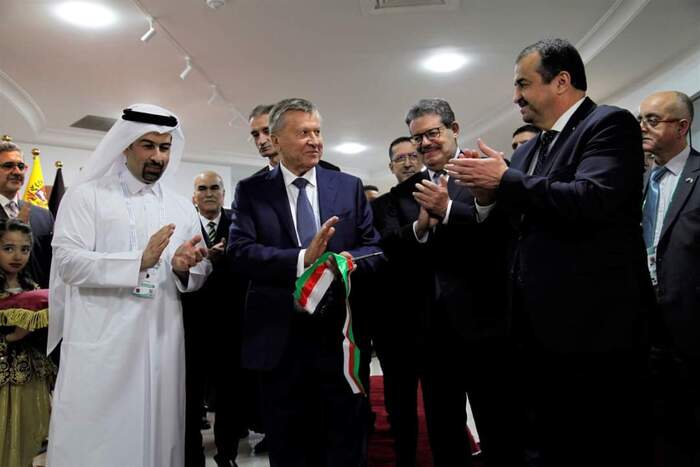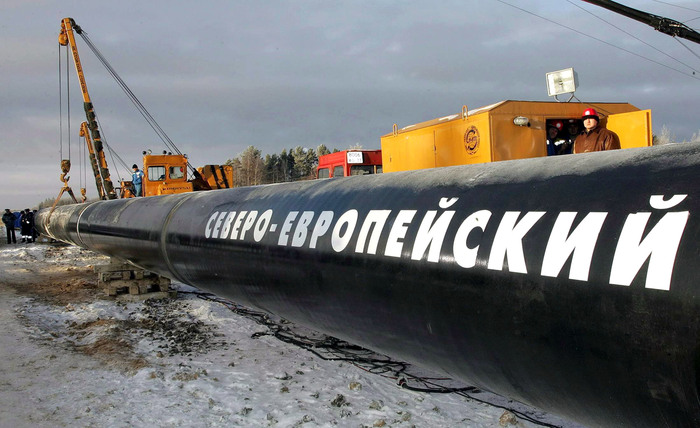Enlarge image
From here, gas is transported to Europe via pipelines: gas extraction system by Hassi R'mel
Photo: Youcef Krache / DER SPIEGEL
While Europe is looking for new gas suppliers to become more independent from Russia, Algeria is also coming into focus.
The Mediterranean country has rich gas reserves and is already supplying gas to Europe.
In addition to plants for the production of liquefied natural gas (LNG), there are three pipelines that connect the country with Europe: one pipeline delivers gas via Tunisia to Italy, two pipelines lead to Spain;
one pipeline directly, the other via Morocco.
However, the Morocco pipeline is currently out of service due to a diplomatic crisis between rivals Morocco and Algeria over disputed Western Sahara, among other issues.
Algeria has instead increased supplies to Spain via the direct pipeline, which was previously under-utilized.
Now a diplomatic crisis between Algeria and Spain has also escalated after Spain unexpectedly changed its stance on the Western Sahara conflict.
However, Algeria, which is backing an independence movement in Moroccan-held Western Sahara, has said gas supplies will not be affected.
Algeria has traditionally been an important gas supplier for Europe, primarily for Spain and Italy, which received 14.3 and 23 billion cubic meters respectively from Algeria last year.
An increase in deliveries of around 40 percent by 2023 has just been decided with Italy.
At the same time, Algeria has close ties with Russia, and Moscow is likely to view developments with skepticism.
According to experts, a further increase in export capacities is not easy for Algeria: firstly, local energy consumption is increasing;
secondly, large investments are necessary for additional deliveries, new fields have to be developed and new plants have to be built.
In the past, the construction of such projects in Algeria often took longer than planned, and the investment climate is considered very difficult due to excessive bureaucracy.
Energy Minister Mohamed Arkab says Europe must first invest in Algeria in order to jointly develop new gas fields.
SPIEGEL:
Mr. Arkab, are you pleased about the renewed European interest in Algerian gas?
Mohammed Arkab:
Our traditional market for natural gas has always been Europe.
The majority of our exports go via two pipelines to Spain and Italy.
In addition, we supply LNG.
We have an interest in expanding our business with Europe and can significantly increase natural gas production in a short period of time.
About half of our gas reserves have not yet been tapped.
SPIEGEL:
You recently agreed additional deliveries with Italy, an increase of 40 percent of the previous volume.
Could you also sell and deliver gas to Germany tomorrow?
Arkab:
We say: if Germany wants to buy gas from us, then open up new deposits with us.
Like the Italians with the ENI group.
We have an ambitious $39 billion program to expand production in the oil and gas sector by 2026.
The state-owned energy company Sonatrach will raise the majority, and we are looking for partners for the rest.
We hope that the Europeans will not change course and leave us alone with the investments.
For a long time, Europe upheld environmental protection and made no distinction between oil and gas.
As a result, no investments were made.
SPIEGEL:
But foreign companies are also reluctant to invest because of excessive bureaucracy and unclear legislation.
Arkab:
In 2020, a new law for oil and natural gas production came into force.
In it we have included international standards for contracting, production sharing and risk contracts.
Investors used to have to go through various government agencies and it was a bit opaque.
Now they have a clear contact person and simplified processes.
With our Italian partner ENI we have signed the first contracts under this new law.
SPIEGEL:
There is also a partnership with the Russian company Gazprom.
How far does Gazprom's involvement in projects in Algeria go?
Arkab:
Gazprom is one of many companies investing in Algeria.
The Company is not currently engaged in any production other than exploration.
SPIEGEL:
Algeria has had close ties with Russia for a long time.
Isn't Moscow unhappy that Algeria is increasing supplies to Europe?
Arkab:
Algeria is everyone's friend.
We are a reliable and safe supplier.
We are free to contract with European companies if it is in the interest of both parties.
Of course, we cannot serve all of European demand, but we have capacities that are not yet used at all.
We want to invite European companies to invest in this production.
SPIEGEL:
Algeria is in a political dispute with Spain and Morocco.
You did not renew the gas supplies for Morocco after the contract expired.
Does Spain also have to fear something like this?
Arkab:
We extended the contracts with Spain and there were no problems.
Algeria honors its treaty obligations and will always honor them.
We have always been a reliable supplier to Europe, even while our country was at war.
SPIEGEL:
Will you increase gas prices for Spain?
Arkab:
The supply contracts are reassessed every three years, both in terms of volume and price.
Most recently, we renewed the contracts with Italy and increased capacity.
Now it's Spain's turn.
The global price of gas follows the price of oil, and when the price of oil goes up like it is doing now, so do gas prices.
It is therefore obvious that an increase is being discussed.
SPIEGEL:
If production is significantly increased, which transport routes would gas take to reach Europe?
Arkab:
We have capacities for LGN exports, and there is also a project for a second pipeline to Italy that is currently on hold.
Why should we build a pipeline when Europeans buy their gas in Russia?
The second project we are currently working on is the 4,000-kilometer Trans-Saharan Pipeline from Nigeria to Algeria via Niger.
Much infrastructure has already been created in Algeria.
The pipeline can be completed in three years and we can transport 20 to 30 billion cubic meters of gas from Nigeria.
SPIEGEL:
There is a competing project for a pipeline from Nigeria via Morocco.
Some European countries seem to prefer that - because they don't want to be solely dependent on Algeria?
Arkab:
Our pipeline is safer and it is economically viable.
The other pipeline would cross 12 countries over 6,000 kilometers and part would cross the Atlantic.
This is infinitely more complicated.
And the financing is also unclear.
Algeria, on the other hand, has the means and is willing to finance a large part of the Trans-Saharan pipeline.
SPIEGEL:
Algeria also has the third-largest shale gas deposits in the world, which, however, would have to be exploited using risky methods such as fracking.
Will you be mining shale gas soon to increase production?
Arkab:
We are only in the evaluation phase for shale gas.
For the time being we are still working on conventional gas, 50 percent of our reserves are untouched.
There are still many unused conventional gas deposits in western Algeria, so far we have worked almost exclusively in the east.
And we have two large untapped fields offshore.
SPIEGEL:
Algeria also has a strategy for the energy transition.
Previous attempts to move away from fossil fuels failed.
Now, will rising oil and gas prices delay that plan again?
Arkab:
We will not make the mistake that we made ten or fifteen years ago.
We want to invest the income from gas sales in the energy transition, which is our priority.
But for the latest technologies we need partners, preferably Germany.
We built the first photovoltaic system with German participation in southern Algeria.
And we would like to work with Germany on the production of green hydrogen.
We can become a partner in renewable energies.
Algeria has 3000 hours of sunshine per year and we have the space required for photovoltaics.
With submarine power lines through the Mediterranean Sea, we could supply Europe with clean, renewable energy.








